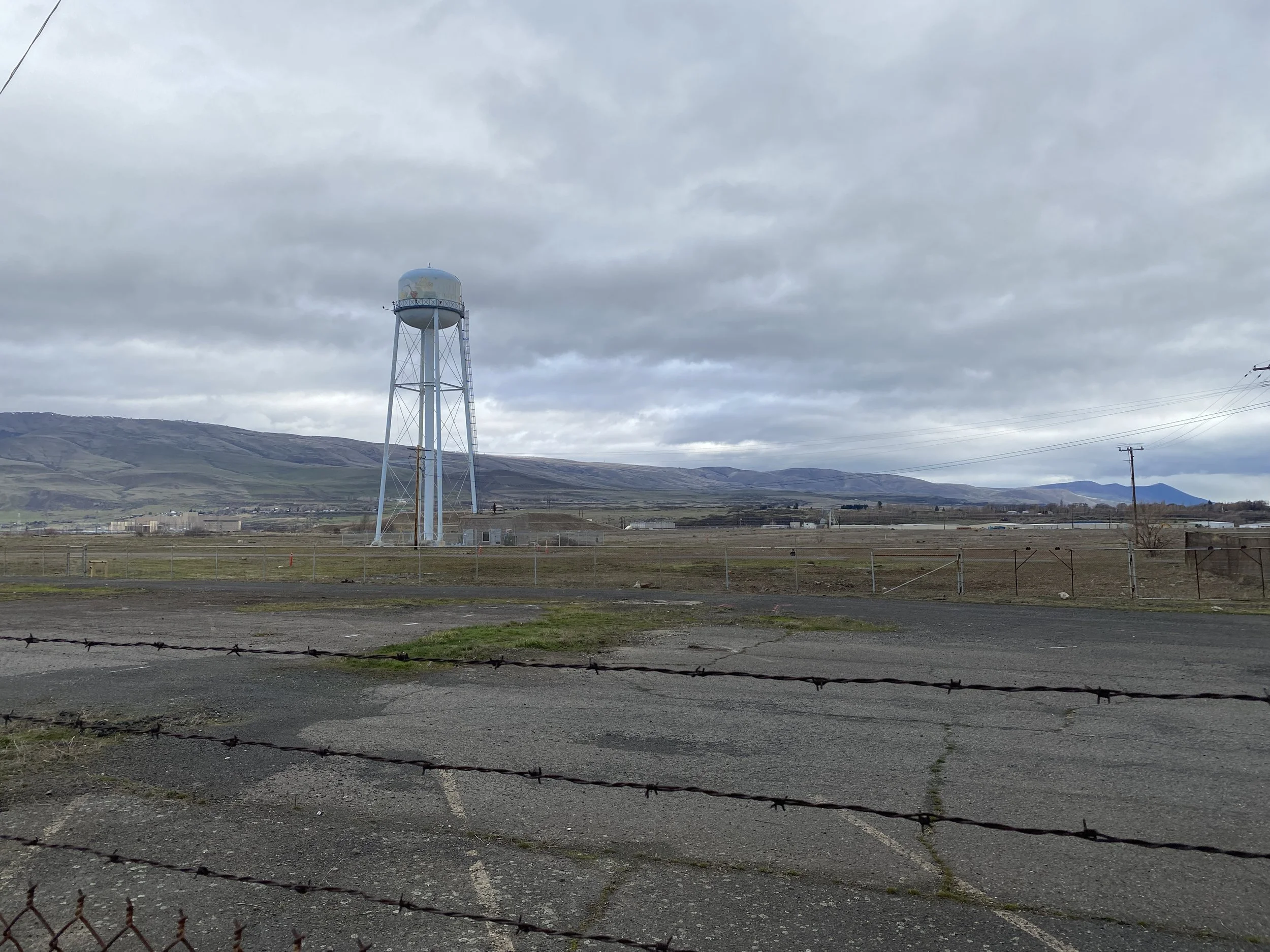$28.5 Million Google Water Deal on Tap for Monday TD Council
Google is willing to give the City of The Dalles water rights for 3.88 million gallons per day that would allow for wells to be placed on this Google Property in the Port of the Dalles. The water tower was torn down several months ago.
By Tom Peterson
The Dalles City Council is set to decide on Monday, Nov. 8 on whether to enter into a $28.5 million agreement with Google for a massive potable water and sewer upgrade in The Dalles.
The issue has been hotly debated among locals as Google has already secured agreements with the City and The County to build two new data plants that will use billions of gallons of water to cool computers.
Based on interviews and public comment, It appears that City Council is united in its opinion to give the deal a green light.
The meeting will be held via ZOOM at 5:30 p.m. Click here to attend. Here’s the agenda and packet.
Ultimately, the question is does the City Council take the deal and triple the size of its current potable water system to help supply the company.
It’s a move that officials are calling a win for The Dalles as it will build out the water system from Brewery Grade to the west end of the Port of The Dalles.
Here is where the Google money would go - this list of infrastructure projects would be made possible if Council votes in favor on Monday, Nov. 8
Or, does Council reverse course, turn down the agreement and let Google go after its own water with their currently-controlled water rights of 3.88 million gallons per day.
Google purchased them from the owners of the former aluminum smelter site.
The City’s Public Works Director David Anderson maintains there is plenty of water to go around.
And if not?
Would Google get water when locals would not?
Depends. If you’re talking about watering your grass, Google and all commercial use trumps grass.
More importantly, public health trumps commercial use, Anderson said. So, if it came to a choice between cooling computers and locals having enough water to drink, cook and shower, humans would come before data plants.
How Much Water?
While it is being kept a ‘trade secret’ Google has tipped its hand a bit. Google operators have told the city two new data centers would use less than Google’s water rights of 3.88 million gallons per day. At full use of those rights, it comes to 1.4 billion gallons, annually.
Dwindling Supplies and Livability
Concerns over climate change and water supplies dwindling and dropping well levels, brought much discussion on the topic at the first Council meeting in September.
The Dalles is not unique in this respect.
Mesa Arizona Vice Mayor Jenn Duff
Mesa Arizona Vice Mayor Jenn Duff had a similar situation last May.
Facebook was looking to build a data center in her community.
Duff was the lone vote against the deal that passed.
"I have very serious concerns about our water in Arizona," Duff said. "As we form Mesa's climate action plan and embark upon the first phase of the seven-state drought contingency plan, making cutbacks to agriculture, I cannot in good conscience approve this mega data center using 1.7 million gallons per day at total build out, up to 3 million square feet on 396 acres," she was quoted as saying in a story on datacenterdynamics.com
CCCNews reached out to Duff to get a better understanding of her reasoning behind the vote.
She said new thinking was necessary for conditions of global warming and scarce natural resources.
In making her decision she said she was choosing livability and equity.
“There have to be other values driving our world now,” she said, noting the economy should not be the only driver. Rather, development needed to be “sustainable resilient, and benefit all.”
“Policies that put additional strain on natural resources have to be equated with the benefits of the jobs or assets,” she added. “And data centers don’t bring a lot of jobs.”
Mayor Rich Mays
The Dalles Mayor Rich Mays maintains the good outweighs the bad.
This is where he comes down.
“Your second question regarding “environmental concerns” and your last question regarding “sustaining natural resources”, I offer the following, he said in an email interview.
Google is conducting a complete remediation of the superfund site located on the old aluminum plant property;
An important part of the agreement calls for Google to make infrastructure improvements that will result in an increase in the City’s water capacity.
Another important part of the agreement calls for a new Aquifer Storage and Recovery program that will consistently replenish the water source.
Google is transferring water rights they currently own in conjunction with the old aluminum plant site to the City.
Google’s use of water in its data centers includes water treatment post cooling resulting in an environmentally clean and safe use of water.
Google has publicly pledged to replenish 120% of its global water usage by the year 2030. The aforementioned transfer of their water rights to the City and the Aquifer Recovery and Storage program are the first steps here in The Dalles to comply with that promise.
Councilor Darcy Long
The Dalles City Councilor Darcy Long said the independent water studies the City completed gave her confidence that a yes vote was the right choice.
Read them here and here and here.
She also said Anderson’s expertise, with 33 years in the city’s Water Department also gave her good cause for confidence. “I trust Dave,” she said.
“We have assurances that there will be a net increase in water to the city,” she said. “Infrastructure to the water system will be completed years ahead of schedule with no taxpayer dollars.”
Blue outlines on the above map indicate where Google would put new data plant development.
Tax Breaks
The City and County have both agreed to 40 percent and 50 percent tax abatements for Google’s two new data centers that are worth up to $147 million over the 15-year-lifespans of the agreement.
So, where will the water come from?
Landon Marston, professor of Environmental and Water Resource Engineering at Virginia Tech
A combination of groundwater and water from The Dalles Municipal Watershed.
The City Staff report states that two new wells placed on the former aluminum plant property with a capacity of producing 5.2 million gallons of water per day could be constructed.
In addition, one of those wells will be used for storing water from The Dalles Municipal Watershed. Water treated at the City’s water treatment plant would be pumped back into the ground through one of the new wells proposed for Google. During fall and winter, millions of gallons of surface water could then be stored for later use in warmer months. It’s called an Aquifer Storage and Recovery Program or ASR.
“You know, I think that's a viable solution,” said Landon Marston, a professor at Virginia Tech. “ “Now, there are probably downstream impacts because when you take water out of the system, someone downstream will not get it.”
Marston said the agricultural use of water in Wasco County stood at 80 million gallons per day, dwarfing Google’s ask.
‘Trade Secret’ challenged
Concerns about having enough water to supply the tech giant stemmed partially from Google’s unwillingness to publicly disclose the amount of water they need.
Google and The City of The Dalles have a non-disclosure agreement about water. Google says it’s a “trade secret.”
And the City of The Dalles is defending that claim in court, currently in a suit against the Oregonian Newspaper who is requesting Google’s current water usage. It will come before a Wasco County Circuit Court Judge in weeks to come. No response from the Oregonian had been filed as of noon on Friday, Nov. 5.
“Google’s water use is simply not the sort of thing that constitutes a trade secret,” said Oregonian Business Writer Michael Rogoway in a response to the city’s denial of his public records request.
“Google has requested or was granted 2.3 billion gallons of water in three states, according to Bloomberg, he wrote. That includes 1.46 billion gallons of water in Red Oak, Texas. And in South Carolina, the company requested 1.5 million gallons of groundwater. In Mesa, the company is guaranteed 1 million gallons a day and up to 4 million gallons a day, Bloomberg reports…”
“It is incumbent on The Dalles to show that disclosure has in some way hurt Google’s competitive position - and not only that, but that water use in The Dalles is in some way different from water use in those other communities where the company’s use is readily available to competitors.”
The City is standing firm on its argument it is in fact a trade secret.
Google’s competitors could use the information to reverse engineer their data plants and gain a competitive advantage, said City Attorney Jonathan Kara. He said Oregon law allowed for the secrecy, but city officials knew the exact gallons requested to develop the water system plan.
“Moreover, the city appears to be primarily concerned with Google’s interests, not the public’s. It references the company’s “highly competitive global market “and i”ts competitive advantage.” Rogoway wrote in the complaint.
“Those are not in any way the public interest. The concerns of a highly successful and lucrative private business are not what are at issue here. The public interest is plainly whether or not Oregonians are getting a good deal from a company whose sole interest is enriching itself.”





